Navigation
World’s Largest Shark Sanctuary Declared in Central Pacific
The Republic of the Marshall Islands is now home to the world’s largest shark sanctuary. The Nitijela, the Marshallese parliament, unanimously passed legislation last week that ends commercial fishing of sharks in all 1,990,530 square kilometers (768,547 square miles) of the central Pacific country’s waters, an ocean area four times the landmass of California.
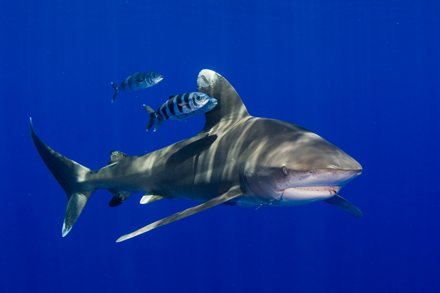 |
| Some species, such as the oceanic white tip, have experienced declines of up to 99 percent. Due to their life history characteristics of slow growth, late maturity, and production of few young, sharks are exceptionally vulnerable to overexploitation and slow to recover once depleted. Photograph by Jim Abernethy courtesy of the Pew Environment Group |
The Republic of the Marshall Islands is now home to the world’s largest shark sanctuary. The Nitijela, the Marshallese parliament, unanimously passed legislation last week that ends commercial fishing of sharks in all 1,990,530 square kilometers (768,547 square miles) of the central Pacific country’s waters, an ocean area four times the landmass of California.
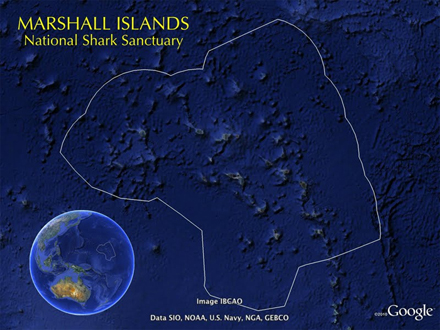 |
Click to go to the Pew Interactive shark conservation map:
Key provisions of the comprehensive Marshall Islands’ law include:
· A complete prohibition on the commercial fishing of sharks as well as the sale of any sharks or shark products. Its zero retention stipulation requires that any shark caught accidently by fishing vessels must be set free.
· Large monetary fines, anywhere between US$25,000 to US$200,000, for anyone who is found to be fishing sharks or in possession of shark fins. In addition, violators would be fined the market value of the product in their possession.
· A ban on the use of wire leaders, a longline fishing gear which is among the most lethal to sharks.
· A monitoring and enforcement provision which requires all fishing vessels to land their catch at one of the country’s ports and bans at sea transfers.
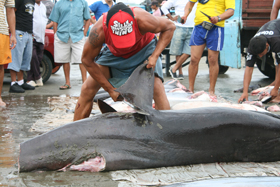 |
| According to the International Union for the Conservation of Nature (IUCN) Redlist, 30 percent of shark and ray species are threatened or near-threatened with extinction.Photograph by Shawn Heinrichs courtesy of the Pew Environment Group |
Last week’s action was initiated in March of this year when the Marshall Islands Marine Resources Authority issued a moratorium on the shark trade.
It was furthered in June, when President Jurelang Zedkaia joined other central Pacific leaders in setting the stage for the creation of a Micronesia Regional Shark Sanctuary, the first regional shark conservation agreement of its kind.
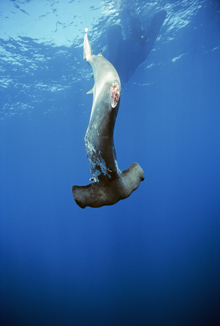 |
| Shark finning is the unnecessary practice of cutting the fins off a shark and discarding the body at sea. The price of one kilogram of shark fins can fetch as much as US$700. Photograph by Jeff Rotman courtesy of the Pew Environment Group |
In July, the Marshall Islands Mayors Association moved to make this vision a reality by passing a resolution that called on the 24 inhabited atolls throughout the Marshalls, each with its own local government, to enact ordinances prohibiting the sale and trade of sharks or shark fins.
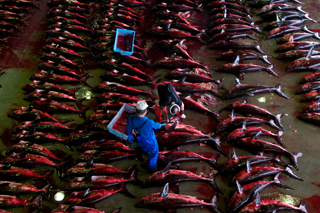 |
| The loss of sharks could cause irreversible damage to the ocean and economic activities, such as dive tourism. The demand for shark fins, meat, liver oil, and other products has driven numerous shark populations to the brink of extinction. Photograph by Shawn Heinrichs courtesy of the Pew Environment Group |
“In passing this bill, there is no greater statement we can make about the importance of sharks to our culture, environment and economy,” said Senator Tony deBrum, a representative from Kwajalein Atoll who is a bill cosponsor.
 |
| Shark fins are a lucrative commodity on the international market, where many are bought for the Asian delicacy, shark fin soup. One bowl of shark fin soup can cost US$100. Photograph by : Michael James Kavanagh courtesy of the Pew Environment Group |
“I thank President Jurelang Zedkaia for his vision and support for this effort. Ours may be a small island nation, but our waters are now the biggest place sharks are protected.
We hope other Micronesian leaders will join with us to make good on our collective promise of a regional sanctuary.”
In addition to deBrum, Senators Michael Kabua (Kwajalein), Jeban Riklon (Kwajalein), David Kabua (Wotho), Jerakoj Bejang (Lib), and Dennis Momotaro (Mejit) cosponsored the enacted legislation.
“We salute the Republic of the Marshall Islands for enacting the strongest legislation to protect sharks that we have seen,” said Matt Rand, director of global shark conservation for the Pew Environment Group, which is spearheading efforts to establish shark sanctuaries, where targeted fishing for these species is prohibited. “As leaders recognize the importance of healthy shark populations to our oceans, the momentum for protecting these animals continues to spread across the globe.”
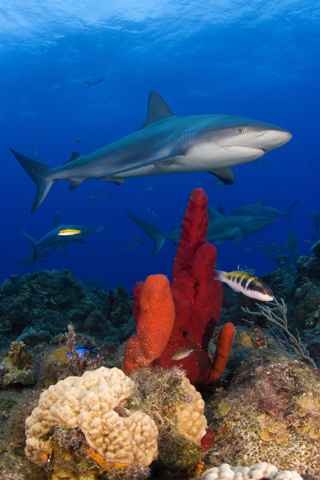 |
| Healthy and biologically diverse shark populations are important to maintaining healthy marine habitats and fisheries. The onset of industrial fishing over the past 60 years has drastically depleted the world's shark populations. Photograph by Jim Abernethy courtesy of the Pew Environment Group |
“The Marshall Islands have joined Palau, the Maldives, Honduras, the Bahamas and Tokelau in delivering the gold standard of protection for ensuring shark survival,” Rand said. “We look forward to helping other countries enlist in this cause.”
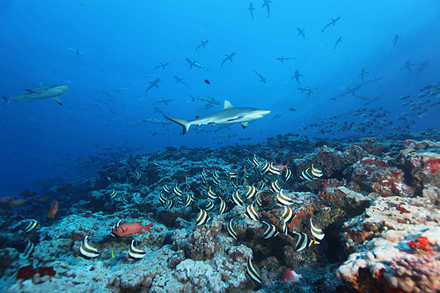 |
| Grey Reef Shark in French Polynesia Photograph by Rodolphe Holler, Tahiti Private Expeditions courtesy of the Pew Environment Group |
This news is from the Pew Environment Group Washington, 2 October 2011
Notes:
See related articles on the Horizon Solutions Site, among them:
Tokelau Declares Shark Sanctuary
and
Chile Ban on Shark Finning Law Published: Praised by Pew which includes videos
and on Horizon International’s Magic Porthole oceans and coral reefs site at www.coralreefs.co and www.magicporthole.org
The Pew Environment Group is the conservation arm of The Pew Charitable Trusts, a nongovernmental organization that works globally to establish pragmatic, science-based policies that protect our oceans, preserve our wildlands, and promote clean energy. For more information, visit www.PewEnvironment.org.
Search
Latest articles
Agriculture
- World Water Week: Healthy ecosystems essential to human health: from coronavirus to malnutrition Online session Wednesday 24 August 17:00-18:20
- World Water Week: Healthy ecosystems essential to human health: from coronavirus to malnutrition Online session Wednesday 24 August 17:00-18:20
Air Pollution
- "Water and Sanitation-Related Diseases and the Changing Environment: Challenges, Interventions, and Preventive Measures" Volume 2 Is Now Available
- Global Innovation Exchange Co-Created by Horizon International, USAID, Bill and Melinda Gates Foundation and Others
Biodiversity
- It is time for international mobilization against climate change
- World Water Week: Healthy ecosystems essential to human health: from coronavirus to malnutrition Online session Wednesday 24 August 17:00-18:20
Desertification
- World Water Week: Healthy ecosystems essential to human health: from coronavirus to malnutrition Online session Wednesday 24 August 17:00-18:20
- UN Food Systems Summit Receives Over 1,200 Ideas to Help Meet Sustainable Development Goals
Endangered Species
- Mangrove Action Project Collaborates to Restore and Preserve Mangrove Ecosystems
- Coral Research in Palau offers a “Glimmer of Hope”
Energy
- Global Innovation Exchange Co-Created by Horizon International, USAID, Bill and Melinda Gates Foundation and Others
- Wildlife Preservation in Southeast Nova Scotia
Exhibits
- Global Innovation Exchange Co-Created by Horizon International, USAID, Bill and Melinda Gates Foundation and Others
- Coral Reefs
Forests
- NASA Satellites Reveal Major Shifts in Global Freshwater Updated June 2020
- Global Innovation Exchange Co-Created by Horizon International, USAID, Bill and Melinda Gates Foundation and Others
Global Climate Change
- It is time for international mobilization against climate change
- It is time for international mobilization against climate change
Global Health
- World Water Week: Healthy ecosystems essential to human health: from coronavirus to malnutrition Online session Wednesday 24 August 17:00-18:20
- More than 400 schoolgirls, family and teachers rescued from Afghanistan by small coalition
Industry
- "Water and Sanitation-Related Diseases and the Changing Environment: Challenges, Interventions, and Preventive Measures" Volume 2 Is Now Available
- Global Innovation Exchange Co-Created by Horizon International, USAID, Bill and Melinda Gates Foundation and Others
Natural Disaster Relief
- STOP ATTACKS ON HEALTH CARE IN UKRAINE
- Global Innovation Exchange Co-Created by Horizon International, USAID, Bill and Melinda Gates Foundation and Others
News and Special Reports
- World Water Week: Healthy ecosystems essential to human health: from coronavirus to malnutrition Online session Wednesday 24 August 17:00-18:20
- STOP ATTACKS ON HEALTH CARE IN UKRAINE
Oceans, Coral Reefs
- World Water Week: Healthy ecosystems essential to human health: from coronavirus to malnutrition Online session Wednesday 24 August 17:00-18:20
- Mangrove Action Project Collaborates to Restore and Preserve Mangrove Ecosystems
Pollution
- Zakaria Ouedraogo of Burkina Faso Produces Film “Nzoue Fiyen: Water Not Drinkable”
- "Water and Sanitation-Related Diseases and the Changing Environment: Challenges, Interventions, and Preventive Measures" Volume 2 Is Now Available
Population
- "Water and Sanitation-Related Diseases and the Changing Environment: Challenges, Interventions, and Preventive Measures" Volume 2 Is Now Available
- "Water and Sanitation-Related Diseases and the Changing Environment: Challenges, Interventions, and Preventive Measures" Volume 2 Is Now Available
Public Health
- Honouring the visionary behind India’s sanitation revolution
- Honouring the visionary behind India’s sanitation revolution
Rivers
- World Water Week: Healthy ecosystems essential to human health: from coronavirus to malnutrition Online session Wednesday 24 August 17:00-18:20
- Mangrove Action Project Collaborates to Restore and Preserve Mangrove Ecosystems
Sanitation
- Honouring the visionary behind India’s sanitation revolution
- Honouring the visionary behind India’s sanitation revolution
Toxic Chemicals
- "Water and Sanitation-Related Diseases and the Changing Environment: Challenges, Interventions, and Preventive Measures" Volume 2 Is Now Available
- Actions to Prevent Polluted Drinking Water in the United States
Transportation
- "Water and Sanitation-Related Diseases and the Changing Environment: Challenges, Interventions, and Preventive Measures" Volume 2 Is Now Available
- Urbanization Provides Opportunities for Transition to a Green Economy, Says New Report
Waste Management
- Honouring the visionary behind India’s sanitation revolution
- Honouring the visionary behind India’s sanitation revolution
Water
- Honouring the visionary behind India’s sanitation revolution
- Honouring the visionary behind India’s sanitation revolution
Water and Sanitation
- Honouring the visionary behind India’s sanitation revolution
- Honouring the visionary behind India’s sanitation revolution

